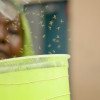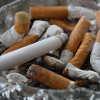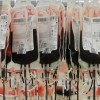An introduction to losing taste
Interview with
The festivities of the Christmas period are well and truly over; it almost feels criminal to bring them up again. But, I'm sure you can easily recall the indulgent spreads and generous glasses of bubbly. It's a good thought, isn't it? Well, for a growing subsection of the population, it might not be. Since the start of the coronavirus pandemic, more and more people have been left with a distorted sense of smell and taste. Out of our five senses, these two definitely seem to rank as the least important, and research is fairly limited in comparison to, let's say, eyesight. Two years on from the initial spread of the virus, what do we know about these mysterious disorders? Harry Lewis went to Future Dreams house in King's Cross to have a good nose at our senses with Barry Smith, professor of philosophy at the University of London and co-director of the centre for the study of the senses...
Barry - So I think we need to start with the idea that we all enjoy food and we all enjoy eating, but what happens when eating goes wrong? What happens when you can't get experience and enjoyment out of food. And that can happen for a number of reasons. Now, we all know that COVID has very often left people with no sense of smell, and when they lose their sense of smell, they suddenly realise how big a contribution that was to tasting the flavours in food, because all the tongue will give them is salt, sweet, sour, bitter, savoury, umami. But everything else, pineapple, mango, melon, the difference between chicken and pork, that's all coming from the nose.
Harry - As Barry alluded to, smell and taste can be affected by a diverse range of conditions and circumstances. You might find it surprising to hear that head injuries, dementia and even chemotherapy treatments can result in a lasting alteration to our sense of smell. And it's our nose that does some of the really heavy lifting when it comes to exploring flavour. As Barry explains:
Barry - Now, when we're eating food, we're using our tongue to get taste, we're using our nose to get the smell and aromas of food, and we're also using this other thing, the trigeminal nerve; that's the fifth facial nerve that serves the eyes, the nose and the mouth. It's the one that rings bells when you have too much wasabi and you feel it at the bridge of your nose - Ow. Now, sometimes, when people are undergoing treatment, that's completely muted. We saw that with COVID too, that people said I could eat a whole jar of mustard and no tingle, no response. But what we're now seeing is that people recover from smell loss, have a week or two where they think their sense of smell is restored and normal, and then they're developing this very, very disturbing condition called parosmia, and parosmia is the distortion of familiar smells. So things you liked, like coffee or chocolate, now become disgusting. I mean, really, really disgusting. The best description I've had from a patient of how coffee is with parosmia is that it's like fruity sewage. Nobody's going to have that.
Harry - So, if somebody else is sitting at home right now, and they're listening and they think to themselves, 'I think I'm suffering from this.' What are those flavours that are likely, what are the patterns of those flavours that are likely to be affected? Or those food or drink items?
Barry - We know that it's coffee. We know it's roasted meats, onions, garlic, eggs, even toothpaste, surprisingly enough, minty toothpaste. A lot of people have switched to cinnamon flavoured toothpaste. Cinnamon seems okay. By finding out which foods are really unpleasant, we learn which are the trigger foods and which are the safe foods.
Harry - Someone who has been figuring out those safe foods all by herself is Claire. When I spoke to her, she did tell me that her condition differs slightly from the symptoms described by Barry.
Claire - Yes. So Christmas Eve last year, myself and my partner both tested positive for COVID. It was a little bit frustrating because we had basically been living like hermits for the previous eight weeks. And yeah, it's changed my life really. If you'd have said you know, fast forward a year, I'd have been in this position, I would never have believed you.
Harry - And what is that position? What is it that resulted after COVID?
Claire - I realised that my smell and taste had departed and I'd kind of hung onto the hope of the six to eight weeks that everybody was telling me that it would bounce back. But as I've gone past each milestone, actually it's now two months, three months, four months. And I'm two weeks away from it being a year, or just under two weeks.
Harry - Yeah. And I think a lot of people are in that situation where they lost their sense of smell and their sense of taste and it returned. But for you, something different happened, didn't it?
Claire - So they term it as phantosmia. So I've ended up having a smoke smell that can come on via a headache, and it'll be with me 24/7 for a week, two weeks. It'll wake me up in the middle of the night. It'll make my eyes water. So when I'm on Zoom calls or Microsoft Teams calls with meetings, it's a little bit embarrassing because it can look like I'm about to start crying. You know, the number of things I've burned both on the hob and in the grill. I mean it's in the tens. So I don't leave anything unattended because you just can't smell it. So yeah, it is frustrating.
Harry - Alongside this phantom smell Claire, also experiences the symptoms of parosmia. Out of curiosity, I asked what she missed the most
Claire - A Lot. Yes. Lots of things. Really. Just being able to smell my home, being able to smell the outdoors if you go outside. You know, I can't smell my partner because we all have - you know, if you put aftershave on. I miss all sorts of food. I can't eat meat. Yeah. There's just all sorts.
Harry - Coffee?
Claire - Coffee. I haven't had a coffee for a year. I long to have a latte. I'd love to have a nice Costa latte, but I can't because when the coffee machine is going downstairs, I have to hold my nose because it makes me gag. So I don't know what it is about coffee and chocolate. Chocolate, I miss the creaminess of a bar of chocolate, a galaxy bar of chocolate just to be able to get depth. So yeah, I can't get any depth in any food. It's so frustrating.
Harry - Claire, it sounds like you are speaking of a lot of people's worst nightmares there really.
- Previous COVID-19: loss of smell and taste
- Next Biofouling in Antarctica










Comments
Add a comment